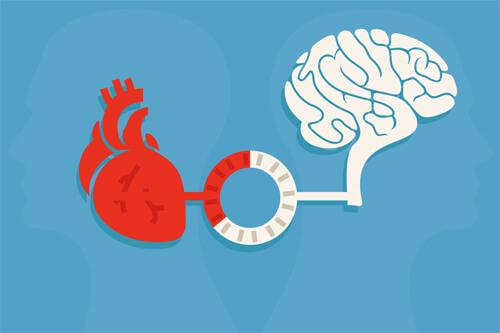Cardiac Coherence: Physical and Emotional Harmony


Written and verified by the psychologist Gema Sánchez Cuevas
Cardiac coherence is a term that describes a state of high physical and psychological efficiency. The heart has about 40,000 neurons, which connect with your emotional brain. The more internal balance and positive emotions you have, the more your heart is in harmony and tells your brain to be calm. That helps ideas flow and stress go down.
It is a fascinating concept that many relate to emotional intelligence. It primarily refers to when your nervous system, endocrine system, immune system and (most of all) cardiovascular system work efficiently while regulating your emotions.
“Eliminate in your life everything that causes you stress and takes away your smile”.
-Paulo Coelho-
Believe it or not, your heart also has its own “brain”. In fact, it has a very complex, interconnected neuronal circuit. It influences your emotions as well as the physiology of your body. Furthermore, your heart stimulates the release of certain hormones, such as adrenaline and oxytocin, which are related to love, affection and prosocial behaviors.
A calm heart, a heart that beats in harmony and interprets that “everything is ok”, sends signals to the brain and the autonomous peripheral nervous system, tuning them in to that same feeling of well-being and calm. This is the fascinating definition of cardiac coherence.

Cardiac coherence: brain and heart connection
To understand the concept of cardiac coherence better, let’s first do a little test. Let’s sit for a few minutes and try to relax. Place your hand on your heart and feel how it beats for a moment.
Does it beat very quickly or rhythmically and calmly? If you’re truly relaxed, your heart rate will be normal and your thoughts will flow calmly, free of pressure and negativity. However, if even while sitting you have a quick or irregular heartbeat, you’re probably under a state of stress or high anxiety. Your heart and brain think you’re in danger.
As you can deduce, emotions such as fear, stress or anger cause your heart to beat quickly and irregularly. When this happens, it causes biochemical and organic chaos. The imbalance extends to the rest of your organs, especially your brain. In fact, your heart sends much more information to your brain than vice versa. This wonderful engineering is made of nerve fibers that go from the heart to the base of the skull.

Cardiac coherence and cardiac chaos
Now, you can see that emotions we call negative, such as anger or irritation, trigger cardiac chaos. However, it should also be said that something as common as always worrying or being tense from work or relationships also disrupts harmony. They also cause an irregular heartbeat.
Cardiac coherence, on the other hand, happens when we feel calm, happy, and satisfied. Harmony in your heart not only reaches your brain and enables you to think better, more positively and more creatively. It also improves your physiological rhythms. It gets our respiratory, circulatory, and digestive systems to work in sync and in a healthier way.
How can we boost cardiac coherence?
Good cardiac coherence has, as you might have guessed, has innumerable benefits. Not only will you feel much better physically, but you’ll also make your brain more efficient at processing information, generating ideas, and connecting with the present.
But how do we do it? How can we boost cardiac coherence? Here are some keys.
“Eliminate in your life everything that causes you stress and takes away your smile”.
-Paulo Coelho-

- Biofeedback. Biofeedback is a very useful type of therapy for people with ADHD, insomnia, chronic pain, phobias, and more. The objective is ambitious and very interesting: to control the person’s physiological functions and thus improve their physical and mental health. If you want to try it, go to a center where they specialize in biofeedback.
- Be more aware of what’s going on inside. We live focusing on the outside and what we have or don’t have. However, we’re disconnected from what’s going on inside us, where the heart and mind are in charge. Learn to listen to yourself, control your breathing, and meditate.
- Yoga, mindfulness, physical exercise. One way to promote cardiac coherence is to practice exercises that make you more aware of your heart, how you breathe, and how you feel. Try spending an hour a day and you’ll get a better mind-body connection.
Cardiac coherence is a term that describes a state of high physical and psychological efficiency. The heart has about 40,000 neurons, which connect with your emotional brain. The more internal balance and positive emotions you have, the more your heart is in harmony and tells your brain to be calm. That helps ideas flow and stress go down.
It is a fascinating concept that many relate to emotional intelligence. It primarily refers to when your nervous system, endocrine system, immune system and (most of all) cardiovascular system work efficiently while regulating your emotions.
“Eliminate in your life everything that causes you stress and takes away your smile”.
-Paulo Coelho-
Believe it or not, your heart also has its own “brain”. In fact, it has a very complex, interconnected neuronal circuit. It influences your emotions as well as the physiology of your body. Furthermore, your heart stimulates the release of certain hormones, such as adrenaline and oxytocin, which are related to love, affection and prosocial behaviors.
A calm heart, a heart that beats in harmony and interprets that “everything is ok”, sends signals to the brain and the autonomous peripheral nervous system, tuning them in to that same feeling of well-being and calm. This is the fascinating definition of cardiac coherence.

Cardiac coherence: brain and heart connection
To understand the concept of cardiac coherence better, let’s first do a little test. Let’s sit for a few minutes and try to relax. Place your hand on your heart and feel how it beats for a moment.
Does it beat very quickly or rhythmically and calmly? If you’re truly relaxed, your heart rate will be normal and your thoughts will flow calmly, free of pressure and negativity. However, if even while sitting you have a quick or irregular heartbeat, you’re probably under a state of stress or high anxiety. Your heart and brain think you’re in danger.
As you can deduce, emotions such as fear, stress or anger cause your heart to beat quickly and irregularly. When this happens, it causes biochemical and organic chaos. The imbalance extends to the rest of your organs, especially your brain. In fact, your heart sends much more information to your brain than vice versa. This wonderful engineering is made of nerve fibers that go from the heart to the base of the skull.

Cardiac coherence and cardiac chaos
Now, you can see that emotions we call negative, such as anger or irritation, trigger cardiac chaos. However, it should also be said that something as common as always worrying or being tense from work or relationships also disrupts harmony. They also cause an irregular heartbeat.
Cardiac coherence, on the other hand, happens when we feel calm, happy, and satisfied. Harmony in your heart not only reaches your brain and enables you to think better, more positively and more creatively. It also improves your physiological rhythms. It gets our respiratory, circulatory, and digestive systems to work in sync and in a healthier way.
How can we boost cardiac coherence?
Good cardiac coherence has, as you might have guessed, has innumerable benefits. Not only will you feel much better physically, but you’ll also make your brain more efficient at processing information, generating ideas, and connecting with the present.
But how do we do it? How can we boost cardiac coherence? Here are some keys.
“Eliminate in your life everything that causes you stress and takes away your smile”.
-Paulo Coelho-

- Biofeedback. Biofeedback is a very useful type of therapy for people with ADHD, insomnia, chronic pain, phobias, and more. The objective is ambitious and very interesting: to control the person’s physiological functions and thus improve their physical and mental health. If you want to try it, go to a center where they specialize in biofeedback.
- Be more aware of what’s going on inside. We live focusing on the outside and what we have or don’t have. However, we’re disconnected from what’s going on inside us, where the heart and mind are in charge. Learn to listen to yourself, control your breathing, and meditate.
- Yoga, mindfulness, physical exercise. One way to promote cardiac coherence is to practice exercises that make you more aware of your heart, how you breathe, and how you feel. Try spending an hour a day and you’ll get a better mind-body connection.
This text is provided for informational purposes only and does not replace consultation with a professional. If in doubt, consult your specialist.







